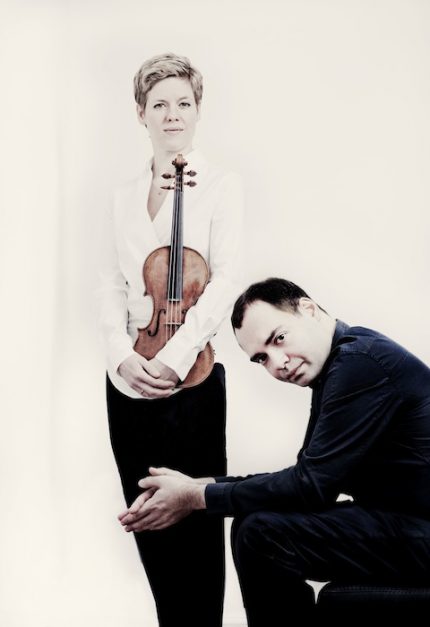Faust and Melnikov bring close rapport, top artistry to Beethoven at Mandel Hall
Programs devoted to a single composer are increasingly rare in chamber and instrumental concerts. Most presenters apparently think, why make the tough sell of classical recitals even harder?
Credit the University of Chicago Presents series then with offering a meat-and-potatoes Beethoven program with Isabelle Faust and Alexander Melnikov. The German violinist and Russian pianist have been recital partners for 15 years, and have recorded much of the major repertoire, including the complete Beethoven violin sonatas. That close musical rapport was consistently manifest in their performances of three Beethoven sonatas Friday night at Mandel Hall.
The evening opened with the Violin Sonata No. 4 in A minor, Op. 23. Faust’s violin timbre is slender with a slight astringent edge, which suited the restless opening Presto. Yet one was always conscious of the preceding Classical era with a grazioso quality evident as well. The two musicians brought out the quirky charm and antic humor of the middle movement–undisturbed by a ringing cell phone–and threw off the hard-charging finale with remarkable unanimity and accuracy at a blistering tempo.
The “Spring” sonata (No. 5 in F major, Op. 24) is a much more lyrical work. That easy-going charm was conveyed in Faust’s elegant rendering of the long opening theme and Melnikov’s sensitive, rippling keyboard work, with both players encompassing the contrasts and stormy passages as well. Throughout the evening, one was struck by the almost symbiotic musical partnership between the artists, each exactly echoing each other’s surges, accents and hairpin dynamic turns even at uncommonly fast tempos.
It’s also a testament to their concentration that they were unfazed by the same ringing phone that broke in on their rapt playing of the Adagio, with Faust’s seamless line beautifully supported by Melnikov’s pointillist keyboard.
As impressive as the playing in the first half was, both players were at their considerable finest in the closing work, Beethoven’s Violin Sonata No. 10 in G major. As in his late quartets, Beethoven appears to be pushing at the structural and expressive boundaries of the violin sonata form in Op. 96, his final work in the genre, which is built on short, elliptical themes and a closely knit integration of both instruments.
Faust and Melnikov were fully in synch with the quirky caprice of the opening Allegro, the supple sweetness of Faust’s violin and Melnikov’s witty and subversive piano work conveying the relaxed playfullness as well as the spare, ascetic moments.
In the stately main theme of the slow movement he artists fully conveyed the sense of ruminative repose with an elevated, searching expression. The deceptive simplicity of the finale’s folk-like motif was a fine foil for the ensuing variations, all boldly and vividly characterized, with the inward sections as sensitively explored as the rollicking virtuosity of the final section was exhilarating.
The enthusiastic ovations brought Faust and Melnikov back out for a single encore of more Beethoven: a scintillating rendition of the final movement of the Violin Sonata No. 8 in G major.
Posted in Performances



